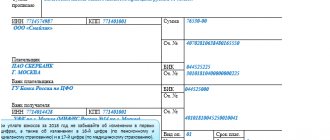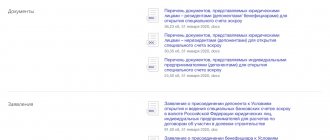Who has the right to block an account and on what basis?
The current account is blocked by the bank (or other structure that performs operations with funds) in which this account is opened. However, the bank does not make the decision to block it independently. Two authorities are responsible for generating information about the grounds leading to the freezing of an account:
- the tax service, which applies blocking as one of the penalties for a person who obeys the rules of the Tax Code of the Russian Federation and has violated some of them;
- Rosfinmonitoring, operating in accordance with the law “On combating the legalization (laundering) of income...” dated 07.08.2001 No. 115-FZ.
The first of these authorities is sufficient to make a decision to block an account in relation to a taxpayer, tax agent or defaulter who has not fulfilled the mandatory requirements of the Tax Code of the Russian Federation, and send this decision to the bank. In this case, you can punish a legal entity, individual entrepreneur, lawyer or notary. Any account can be frozen (ruble, foreign currency, precious metals). An exception is made for special election accounts and accounts related to referendum funds.
The main reason for blocking an account by the tax service is tax non-payments (Clause 1, Article 76 of the Tax Code of the Russian Federation). But there may also be reasons such as (clause 3, 3.2 of article 76, clause 10 of article 101 of the Tax Code of the Russian Federation):
- failure to submit mandatory reporting (declaration or consolidated quarterly personal income tax report) after the deadline established for its submission (10 working days);
- failure to comply with the rules of electronic interaction with the tax authority (failure to provide mandatory communication via TCS, failure to send confirmation of receipt of electronic information from the Federal Tax Service within the allotted control period of 16 working days);
- ensuring the receipt of funds accrued by the tax service for payment as a result of control measures carried out.
If you have access to ConsultantPlus, look at the experts’ instructions on how to unblock your account and start taking action. If you don’t have access to K+, get a free trial access and go to the Ready-made unlocking solution.
Law No. 115-FZ contains only two grounds for blocking an account (Article 3):
- The account owner is included in the official list of persons suspected of criminal activity (extremism, terrorism, proliferation of weapons of mass destruction) published on the Rosfinmonitoring website.
- The account owner is not mentioned in the list published on the Rosfinmonitoring website, but the same source of information cites a blocking decision made either by Rosfinmonitoring itself or by a body authorized by it (the Interdepartmental Commission).
Moreover, these grounds apply to any persons having an account (legal, natural, including foreign and stateless).
The bank itself can also identify points that make it treat the client with suspicion and apply the provisions of Law No. 115-FZ to him. But in this case he does not have the right to independently block the account. It is only possible to suspend for up to 5 working days (Clause 10 Article 7, Clause 8 Article 7.5 of Law No. 115-FZ) the execution of a questionable operation by reporting it to Rosfinmonitoring, which will make (or not make) a decision on temporary (for a period of up to 30 days - Article 8 of Law No. 115-FZ) account blocking. After all the circumstances have been clarified, this procedure may result in the client being included in the list of persons suspected of criminal activity.
How to remove restrictions from a current account
If checking the blocking of a current account with the Federal Tax Service shows the presence of restrictions, then how can they be removed? To do this, you need to contact the tax office, establish the exact reason for the ban on expense transactions, and then comply with the requirements of the fiscal authorities (which most often means paying tax debts or submitting reporting documents).
Only after this can the Federal Tax Service issue a new decision to remove all restrictions on transactions with a current account. And as soon as the bank receives this notification, it undertakes to provide the current account owner with access to financial funds as soon as possible.
If the issue cannot be resolved with the Federal Tax Service, then experts recommend immediately turning to court for help. However, unblocking will be possible only after a final decision has been made, which may take several months - this factor should be taken into account. But the applicant gets the opportunity to claim compensation for lost probable income, but only if this fact is proven in court.
There are a lot of legal nuances here; only an experienced lawyer can understand them. Therefore, you will definitely have to enlist the support of a qualified lawyer.
Can the enterprise operate under current restrictions? Theoretically - yes, in practice - only if there is an additional source of finance from which the costs for the period of proceedings with the tax authorities will be covered.
Consequences of account blocking
Freezing an account by decision of the tax service has two restrictions:
- applies only to a certain amount of funds (i.e. partial blocking);
- complete cessation of account transactions.
The first situation is typical for a blockage caused by tax non-payments. With it, using the account is permissible, but with maintaining a certain balance of funds on it. It is allowed to use this balance to make payments with a priority corresponding to tax transfers, or with a higher order (Clause 1, Article 76 of the Tax Code of the Russian Federation).
However, whatever the option for limiting the use of the account, the presence of a block by decision of the Federal Tax Service entails the impossibility of opening an account anywhere else (clause 12 of Article 76 of the Tax Code of the Russian Federation).
Blocking under Law No. 115-FZ always leads to a complete ban on transactions on accounts and also does not allow the possibility of opening a new current account (clause 5.2 of Article 7 of Law No. 115-FZ).
Regardless of which document (Tax Code of the Russian Federation or Law No. 115-FZ) the account is frozen, this process takes place very quickly:
- The tax authority notifies the bank of the decision made electronically (clause 4 of Article 76 of the Tax Code of the Russian Federation), and the bank is obliged to take the necessary actions on the day it receives it (clause 7 of Article 76 of the Tax Code of the Russian Federation). The perpetrator of such actions is provided with information during the working day following the day the decision is made (Clause 4 of Article 76 of the Tax Code of the Russian Federation).
- The bank monitors information on the grounds for blocking according to Law No. 115-FZ independently. But he must also respond within one working day (subclause 6, clause 1, article 7, clause 5, article 7.5 of law No. 115-FZ). In this case, the client is not required to be informed.
Thus, the person whose current account is blocked will be the last to know about the blocking.
Read about when blocking an account should be considered illegal.
Why does the tax office block accounts, types of blocking?
There are two ways to block accounts:
- For all expense transactions, regardless of the amount. The client cannot carry out expense transactions, except for paying taxes and payments under writs of execution, i.e. for payments from the first to third priority groups.
- For expense transactions in the amount of debt. An amount equal to the arrears of taxes, fees and penalties is blocked on the client's account. Funds above this amount can be freely disposed of.
Note : Example: the tax office blocked the account of an LLC in the amount of 10 thousand rubles. The balance at the time of blocking is 30 thousand rubles, therefore, the client can freely manage funds within the limits of 20 thousand rubles.
Reasons for suspending transactions on current accounts in the amount of debt:
- There was arrears in paying taxes, penalties and fines.
- The requirements based on the results of the inspection by the Federal Tax Service have not been met.
- Reasons for suspending transactions on current accounts for all transactions:
- The tax return was not submitted on time.
- The technical ability to receive electronic documents from the Federal Tax Service is not provided.
- The receipt of the request to appear at the Federal Tax Service Inspectorate office or the provision of documents or explanations was not submitted.
- The calculation of personal income tax amounts is not presented. persons counted and retained by the organization.
Note. The Federal Tax Service, as a rule, blocks all client accounts, including foreign currency ones. Therefore, the total amount of blocking may be several times greater than the amount of debt, and if operations on all current accounts are completely stopped, the company’s activities may be paralyzed.
When is the best time to check for blocking?
Despite the above, it is possible to independently track the fact of blocking for tax reasons, as well as check the counterparty for blocking the current account. In the latter case, depending on who is being checked, the following options will be applicable:
- Any person dealing with him will be able to check whether a counterparty has blocked an account by the tax service. There are no restrictions on access to this data.
- Information posted regarding a counterparty on the Rosfinmonitoring website can only be seen by the bank (or other person conducting transactions with funds). This information is not available to other persons.
That is, persons carrying out transactions with funds will be able to use both verification methods. While all other persons can check their counterparty only for blocking on tax grounds.
When is the best time to check? Persons conducting transactions with funds have to do this on a daily basis, since they are required to promptly respond to all types of grounds for blocking: both contained in Law No. 115-FZ and those provided for by the Tax Code of the Russian Federation.
For other counterparties, the fact that a partner has a block may be of interest in two aspects:
- when the counterparty intends to transfer money to the partner and fears that the recipient will not be able to use it;
- when he is just planning to enter into a relationship and wants to check a potential partner for problems of this kind.
Accordingly, in the first case, the presence of a block is checked immediately before the transfer of funds, and in the second - at the stage of checking a potential counterparty.
Check your current account online
There are not very many truly effective and truthful services where you can check the current account of an organization or individual (IP), but they still exist, and sometimes you need to use them.
Data on the bankruptcy of a legal entity can be easily checked on the State Registration Bulletin website.
Other sites for checking the counterparty:
- Nalog.ru;
- Bailiffs of the Russian Federation;
- Kartoteka.ru.
Some resources offer a paid service - providing an extract from the Unified State Register of Legal Entities. Such promises should be treated with caution, since most of these “helpers” are actually scammers.
How can you find out if your account is blocked?
Whether the counterparty's account is blocked - how to find out? To do this you need to use one of the sites:
- Federal Tax Service, which has a special service designed to reflect information about documents sent to the bank and received from the bank to the tax authorities;
- Rosfinmonitoring, where a bank (or other person carrying out transactions with funds) opens a personal account, giving him the opportunity to get acquainted with the site data.
The service created on the website of the Federal Tax Service was originally intended to promptly and reliably inform banks about the blocking of customer accounts available in other similar structures. However, it allows its use by any person interested in such information, without requiring any special training or special knowledge for this.
How does the tax office decide to block a current account?
Most often, the sequestration of funds in bank accounts is carried out by the desk department of the Federal Tax Service Inspectorate (hereinafter referred to as the Federal Tax Service Inspectorate). Its employees check all incoming declarations and other reporting from payers. They are the ones who monitor the timeliness of submission and correct completion of tax reporting, and exchange electronic documents via telecommunication channels (hereinafter referred to as TCS).
Having discovered a violation, a specialist from the office department draws up a document - a decision to bring the violator to justice, endorses it from the head of the inspection and seizes the payer’s bank account.
The tax office sends the decision to suspend transactions on accounts to the bank and the organization itself no later than the next day after its adoption. The decision is sent to the bank by email, and to the taxpayer by registered mail. Often, an entrepreneur receives a letter when the account is already blocked.
Having received a tax decision, the bank is obliged to immediately execute it and notify the Federal Tax Service of the amount of funds in the payer’s current account. Some banks inform their clients about the seizure of the current account and the suspension of operations - this is a personal initiative of the banks; by law they are not obliged to do this.
You might be interested in
Every business is unique in its own way. RKO for a specific type of business. Current account + a set of useful banking services on preferential terms.
find out more details
To stay informed about the status of your current account, use remote banking systems - it’s faster than receiving registered letters from the tax office.
Procedure for checking for blocking by TIN
Is the counterparty's account blocked - how to check? What data is needed for this? There is nothing complicated here. You can check whether a counterparty has blocked an account using the TIN, i.e., using an indicator that is publicly available.
The verification procedure itself is very simple. On the page that opens on the website, you must select the type of request that corresponds to the information on suspension decisions, and then enter the counterparty’s TIN and BIC of any of the existing banks in the available fields.
After entering a special code that provides protection against spam, the service will generate a response to the request, which will either contain a message about the absence of blocking, or will display a table with information about all decisions made about blocking and which banks they were sent to.
Results
Account blocking can be carried out on the basis of the Tax Code of the Russian Federation and Law No. 115-FZ. Information about this is available, respectively, on the websites of the Federal Tax Service and Rosfinmonitoring. On the first of them, it is in the public domain, on the second, only structures that conduct transactions with funds have the right to get acquainted with it. Is the counterparty’s account blocked? How can I find out on the Federal Tax Service’s website? To do this, it is enough to know the TIN of the counterparty.
Sources:
- Tax Code of the Russian Federation
- Federal Law of August 7, 2001 No. 115-FZ
You can find more complete information on the topic in ConsultantPlus. Full and free access to the system for 2 days.








